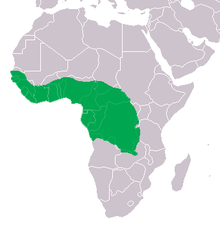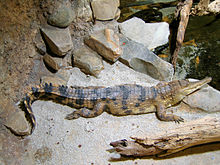- Slender-snouted crocodile
-
African Slender-snouted Crocodile Conservation status Scientific classification Kingdom: Animalia Phylum: Chordata Class: SauropsidaFile.jpg Order: Crocodilia Family: Crocodylidae Subfamily: Crocodylinae Genus: Crocodylus Species: C. cataphractus Binomial name Crocodylus cataphractus
Cuvier, 1825
Range map Synonyms Mecistops cataphractus
The African Slender-snouted Crocodile (Crocodylus cataphractus) is a species of crocodile. Recent studies in DNA and morphology suggest that it may belong in its own genus, Mecistops,[1] but at present most continue to use Crocodylus for this species.[2]
African Slender-snouted Crocodile are native to freshwater habitats in central and western Africa. They are a medium sized crocodile and grow to about 3 to 4 metres long. They have a slender snout used for catching prey, hence their name. Their diet consists of mainly fish, snakes, amphibians and crustaceans.
African Slender-snouted Crocodile begin to breed in the rainy season. The female constructs a mound nest consisting mainly of plant matter, which is sited usually on river banks. The eggs have a long incubation period, sometimes up to 110 days.
This species is generally not found in groups, except during the onset of the breeding season. The female constructs a mound nest consisting mainly of plant matter. Nests are sited on the banks of rivers, and construction generally begins at the onset of the wet season, although breeding is asynchronous even within members of one population. It has a similar, but generally shorter nesting season than that of the sympatric Osteolaemus tetraspis, which may nest further from the riverine habitat frequented by C. cataphractus. The slender-snouted crocodile lays an average of 16 (minimum 13, maximum 27) very large eggs (relative to body size) about a week after completion of the mound nest. The incubation period is long compared with most other crocodilian species, sometimes lasting over 110 days. The female remains close to the nest, but does not defend it with the same vigour as some other species of crocodilians. Once the eggs begin to hatch, and the juveniles emit their characteristic chirping, she will break open the nest and assist in the hatching process. Hatchlings then disperse across the flooded forest floor. Although losses from predators do occur (e.g. by soft-shelled turtles), they apparently are minimal, possibly accounting for the small number of relatively large eggs laid, and the long incubation period.They also have very sharp teeth for protection.it is one of the three crocodiles in africa.the other two are the dwarf and nile crocodiles.
Though its status is unknown, it is believed that the population is dwindling and may be threatened. in addition,there range still is largly unknown[especially where they are common]
References
- ^ McAliley, Willis, Ray, White, Brochu & Densmore (2006). Are crocodiles really monophyletic?—Evidence for subdivisions from sequence and morphological data. Molecular Phylogenetics and Evolution 39: 16-32.
- ^ Crocodylus cataphractus. CROCODILIANS Natural History & Conservation. Accessed 2008-06-28
- Crocodile Specialist Group (1996). Crocodylus cataphractus. 2006. IUCN Red List of Threatened Species. IUCN 2006. www.iucnredlist.org. Retrieved on 20 September 2011. Listed as Data Deficient
Extant Crocodilian species Kingdom: Animalia · Phylum: Chordata · Class: Sauropsida · (unranked): Archosauria · Superorder: Crocodylomorpha Family Gavialidae Family Alligatoridae Alligatorinae
(Alligators)Caimaninae
(Caimans)Categories:- IUCN Red List data deficient species
- Crocodilians
- Crocodylidae
- Reptiles of Africa
- Reptiles of Sierra Leone
- Archosaur stubs
Wikimedia Foundation. 2010.


